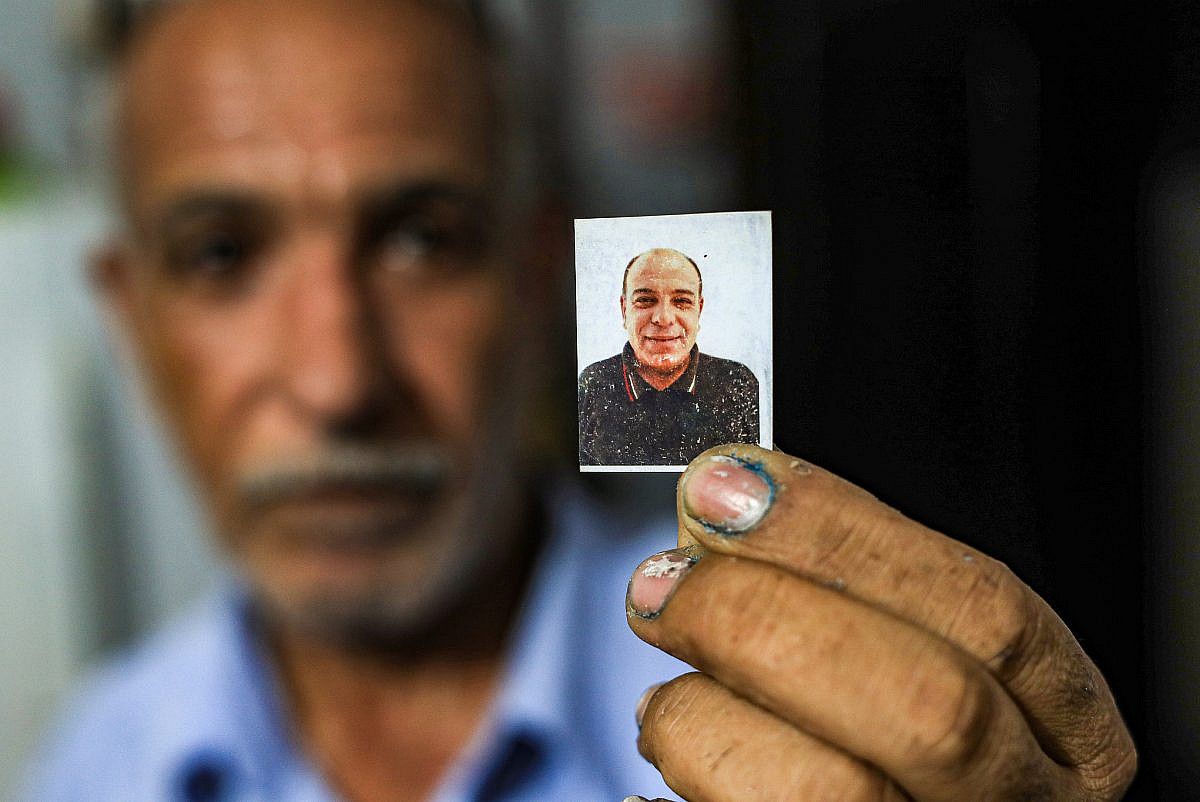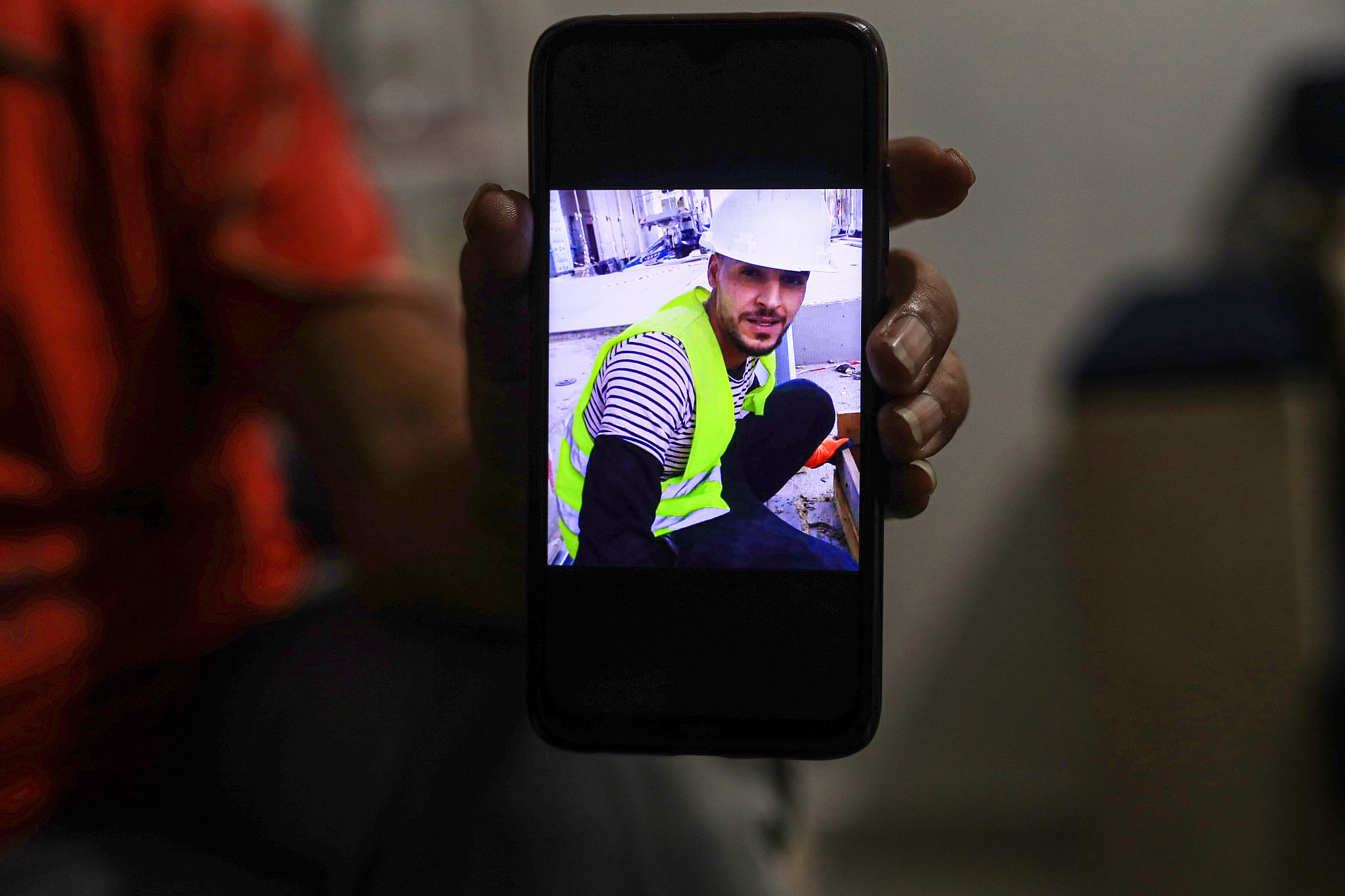When Gaza resident Ziad al-Gul received his long-awaited Israeli work permit in January 2023, it was one of the happiest moments of his life.
Al-Gul, 53 and a father of six, was barely making a living through peddling, bringing home around $10 a day and struggling with more than $11,000 in debt. Friends helped him get a job in a bakery in Majdal Shams, a town in the occupied Golan Heights, which brought in around NIS 250 a day and helped keep his poverty-stricken family afloat. “All he wanted was to pay off his debts and help his son, who has health issues,” said his brother, Riad.
After two months, al-Gul sought better work in Israel, and found a job in a vegetable-processing plant near the Gaza Strip. When the factory had to undergo maintenance, the employer gave all staff a two-day vacation while the work was carried out. But because al-Gul did not want to miss even a single day of income, he sought work elsewhere for those two days, finding a job in another factory whose location his family members do not know.
Those two days cost al-Gul his life. On the afternoon of March 3, Gaza’s Labor Ministry informed his family that he had died.
“The ministry told us that a forklift truck had dropped a heavy load on Al-Gul by accident. When his body was returned to Gaza, we were astounded to see that all the medical documents had come from Magen David Adom, meaning that he had not been hospitalized and there was no autopsy,” Riad said, angrily. Unlike the ministry’s explanation, the medical report stated that Al-Gul had died as a result of a stroke he suffered at work, but it did not specify where his workplace was, nor did it explain the multiple signs of physical trauma on his body.
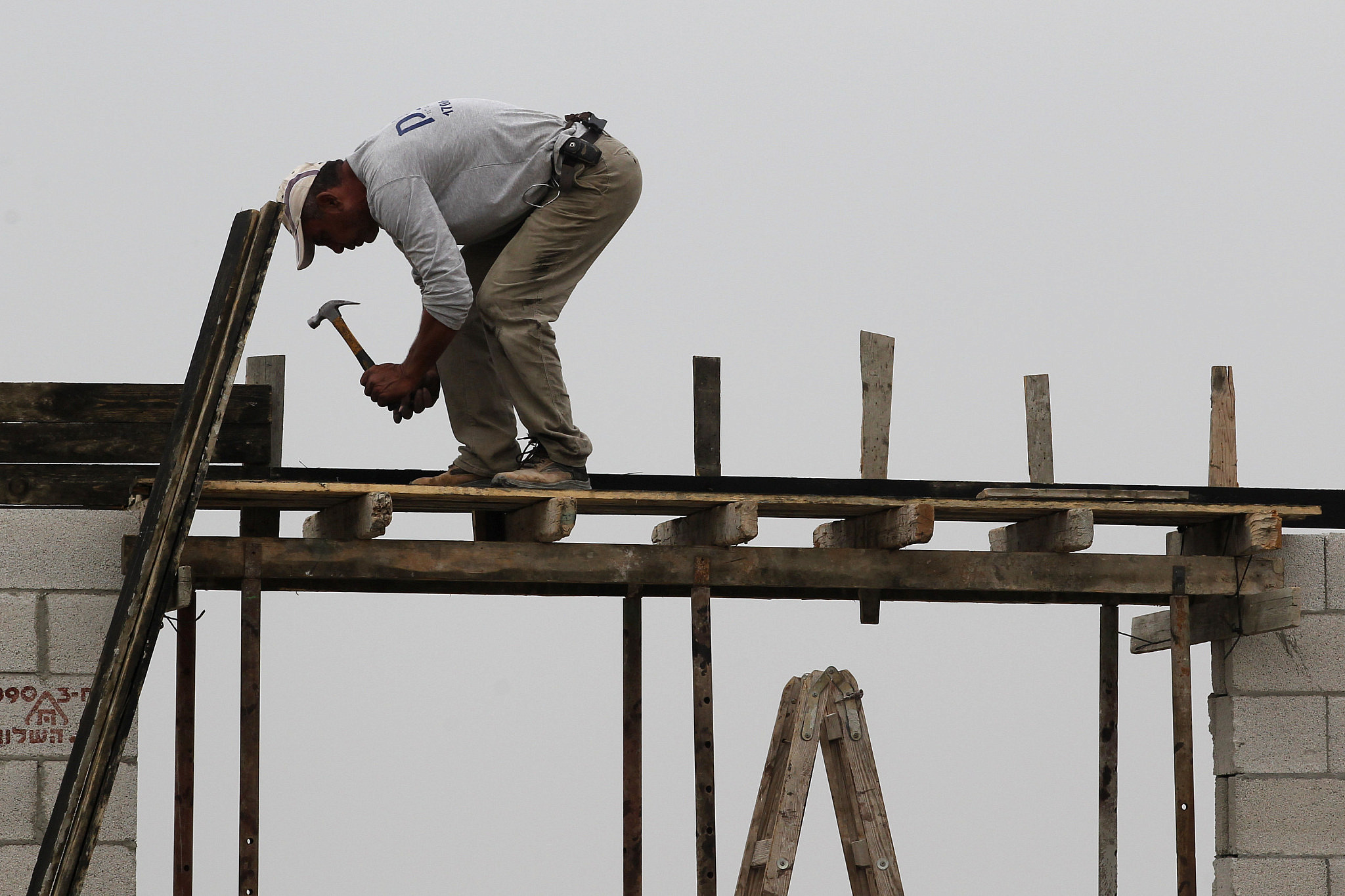
“This is absolute nonsense,” Riad said. “How can a stroke cause his face and his back to turn blue, and break his ribs?” He believes that there were ulterior motives for the dubious report: “They said this in order to exempt his employer from their obligation to take responsibility or pay damages.” Al-Gul’s family hired a lawyer in Israel to track down the business owner and sue them, so far without success.
“He was a beloved, tolerant, and simple man, who lived and died unhappily,” lamented Riad.
According to Kav LaOved, a labor rights NGO in Israel, such workers from the occupied territories have little to no protections in Israel and their working conditions are unsupervised. Palestinian workers, who are often employed in sectors where there is a high risk of accidents, such as construction, have no authority they can turn to unless their employer has an employment permit and pays a regular wage.
Most Palestinian workers enter Israel for a period of a week or more, in order to avoid problems with the authorities who manage the checkpoints — and who sometimes reject their exit permits without warning. Israel turns a blind eye to the fact that the permits generally do not allow overnight stays inside the Green Line; workers usually stay in Palestinian communities in Israel and the occupied West Bank, with several residents to an apartment, all trying to keep a low profile. They bring clothes, towels, and hygiene products with them when they enter Israel; on their way back into Gaza, they sometimes discard these items so that they can bring back other things acquired inside that are more important to them — whether food, toys, or new clothing.
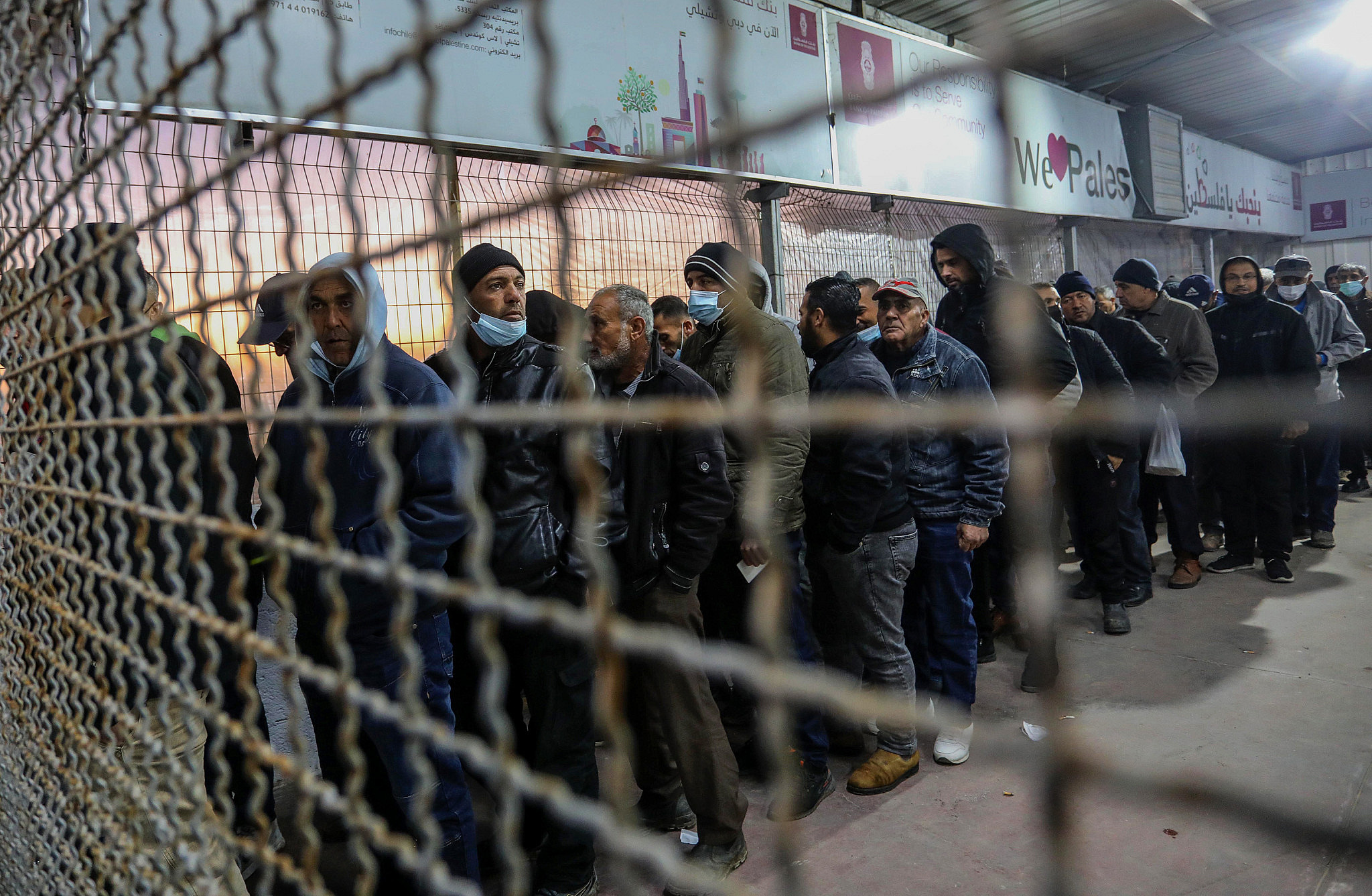
Kav LaOved is aware of complaints of many employers who exploit workers’ vulnerabilities and the lack of oversight in order to delay wages or avoid paying them altogether. In the southern city of Ashkelon, a Palestinian “slave market” has emerged, frequented by business owners who search for day labor there. Most of these owners return the workers to Ashkelon, from where the Palestinians go to the Erez Crossing by foot in order to re-enter Gaza — a journey of over six miles — in order to save on travel costs.
When Israel resumed issuing work permits to Palestinians in Gaza at the end of 2021, following a 15-year ban, the legal rights group Gisha, which advocates for the freedom of movement of Palestinians in the Gaza Strip, published a report addressing the permit system’s failures, and pointing out how it leaves Palestinian workers exposed to abuse and the violation of their human and labor rights. The paper further noted that over 100,000 Gaza residents initially submitted applications when Israel resumed granting workers’ permits.
A year ago, Gisha and Kav LaOved jointly requested that the Coordinator of Government Activities in the Territories (COGAT), the military body that oversees civilian affairs in the occupied territories, clarify the terms of employment for Palestinians from the strip. They have yet to receive a response.
‘I still cannot understand why they killed my son’
Mahmoud Aram, a 27-year-old construction worker in Khan Younis in northern Gaza, was left with a damaged retina following a 2019 workplace accident. Because the medical care he needed was not available in Gaza, he was referred to treatment in Jerusalem.
The difficult living conditions under siege in Gaza led Aram to stay in the West Bank following his treatment, and he eventually found work in Jericho. A few months later, he was also frequently working inside Israel. “He was always telling me that he wanted to go back to Gaza and get married,” said Aram’s father, Sami. “But the living conditions here didn’t permit him.”
On May 8, 2022, Aram was in the West Bank town of Tulkarem on his way to work. According to the Gaza-based Al Mezan Center for Human Rights, Israeli soldiers shot him at around 2 a.m. at the Jabara checkpoint, south of Tulkarem.
“I called him a few times at 2:30 a.m., but he didn’t answer,” Sami said, his voice choking with tears. “As I was on my way to the beach, I got a call from his friend, who told me Mahmoud had been killed. I didn’t believe him. I rushed home, but we only found out the details in the media.”
Because Israel held on to Aram’s body, Al Mezan represented the family in the Israeli courts, and managed to get his remains released after three days. “I still cannot understand why they killed my son,” Sami said. “He was a poor citizen who worked for a living.”
According to Sami al-Amasi, head of the Palestinian General Federation of Trade Unions, there are around 18,000 Palestinians from Gaza working in Israel, 13 of whom have died in workplace accidents in the last year alone. Around 16,000 workers have economic-based permits, which do not cover work-related injury or death.
“These workers cannot sue Israeli businesses for violating their rights because of the [kind of] permit they have,” al-Amasi said. “A high percentage of Israeli employers refuse to pay for medical care in Israeli hospitals for employees from Gaza; with no other choice, they are forced to return to Gaza for treatment,” he continued. Even though many workers from Gaza suffer workplace injuries, these incidents are not recorded by the Gaza Labor Ministry or labor unions.
Most read on +972
“They don’t want to document the injuries because they’re afraid of jeopardizing their work permits,” al-Amasi said. “They have to work in Israel, because the daily wage in Gaza is $10 and unemployment is sky-high.”
When Khaled, who is diabetic and has heart trouble, received his work permit, he believed his intolerable financial circumstances were about to improve. He ran a vegetable cart in Gaza, bringing in $5-10 a day, which made it difficult for his family to survive.
A father of eight, Khaled went to work in Israel in March 2023, but after just 12 days his hope turned to despair when he was injured in a workplace accident, which left him with a fractured hip.
“We moved crates of vegetables,” Khaled recalled. “As I was carrying a heavy crate, I fell to the ground and my hip broke. I couldn’t move. My employer mocked me, telling me to ‘stop fooling around, stand up, and keep working.'” After some time had passed, his employer drove him near his place of residence, rather than to a hospital.
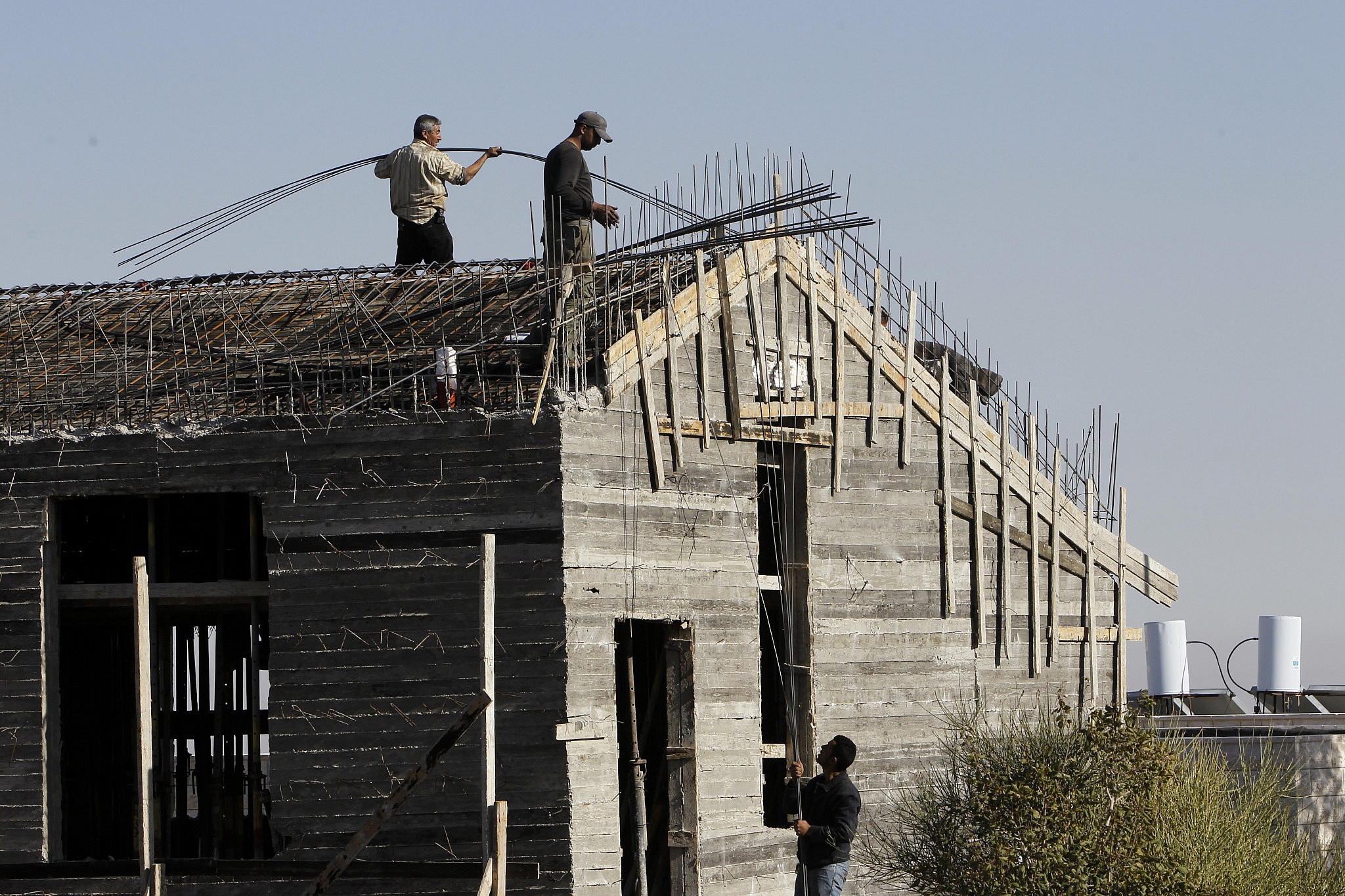
“He refused to take me to my room on the second floor; I was left screaming in pain for an hour until two other workers came and carried me upstairs,” Khaled said. “My employer refused to take me to the hospital for treatment and said that my permit does not cover medical care.”
Khaled spent the next two days in agony, being treated only with painkillers. Another worker from Gaza then took him back to the strip, where doctors told him that he needed to either return to Israel for treatment or to lie on his back for 60 days without moving, in order to allow his body to heal.
“I couldn’t get a referral,” Khaled said, as he lay on a wooden bed in his humble home. “I needed expensive food, such as beef, chicken, and vegetables, as well as medicines costing $120 a month. I called my employer and told him about my challenging circumstances, but he didn’t send me a shekel.” Although Khaled is slowly recovering, he still cannot work.
“Why haven’t I sued my employer? Because my permit doesn’t cover work-related injuries, and I’m afraid of losing it,” Khaled explained. “When I’m better I’ll go back, even with the same permit, because I have a $5,500 debt to pay.”
This article was originally published in Hebrew on Local Call. Read it here.

